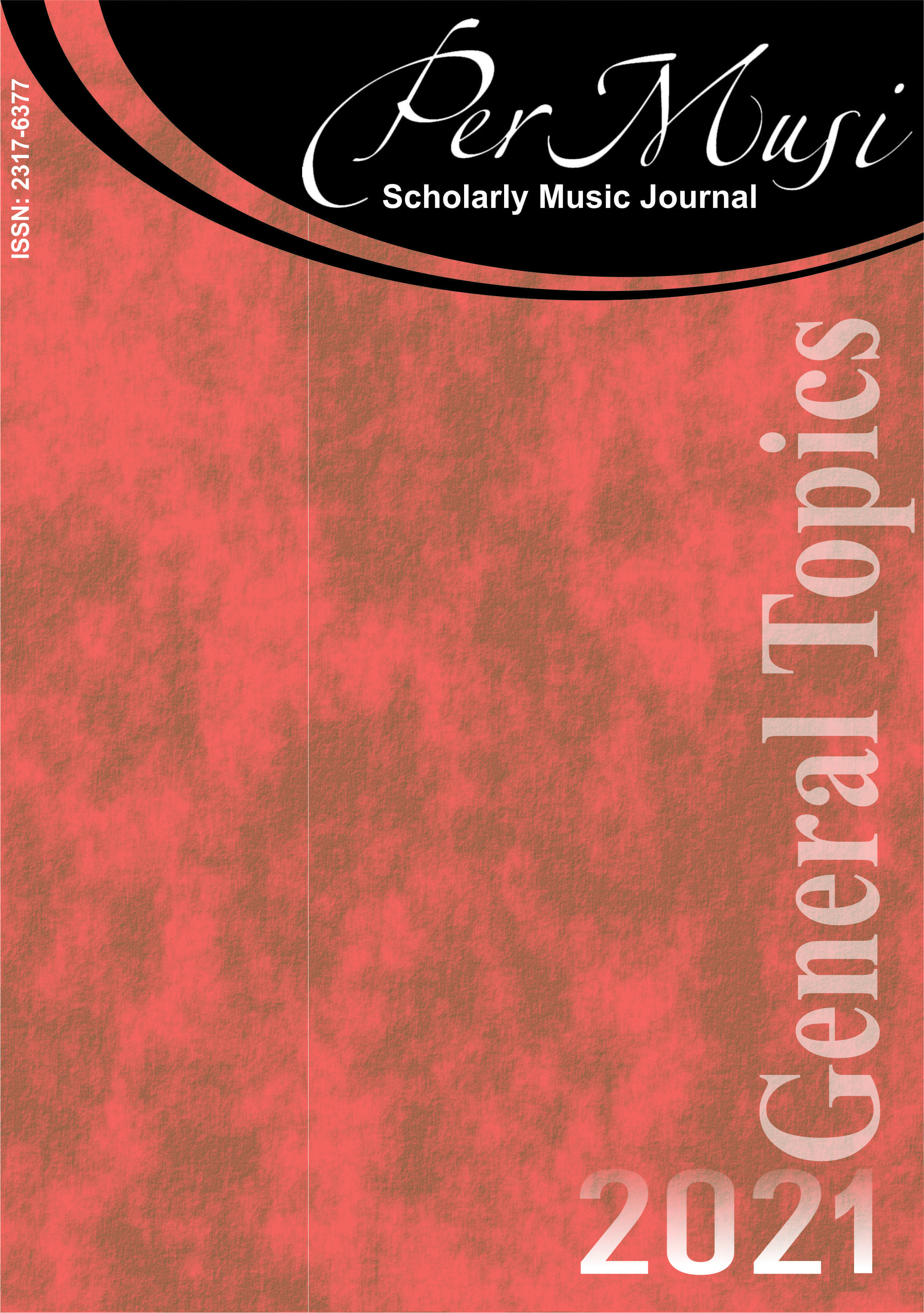Multiplicity of vocal dramatic and expressive resources from the analysis of the work Sound - for four female voices, light, scene and amplification - by Luiz Carlos Csekö
DOI:
https://doi.org/10.35699/2317-6377.2021.34851Keywords:
Contemporary vocal music, Interfaces singing performance, Hybrid graphic notation, L. C. CseköAbstract
This article aims to investigate the multiplicity of vocal, dramatic and expressive resources, besides to the diversity of styles and trends in the interfaces between singing and performance and the expansion of the scenic-musical space based on the analysis of the work Sound, for four female voices, light, scene and amplification by composer Luiz Carlos Csekö. After a brief account of the composer's trajectory, the strategies used by Csekö to register his work such as Hybrid Graphic Notation, Suspended Time and Interfaces with Multimedia and Intermediates, beyond the use of miking and amplification in his approach to the concept of electroacoustic amalgam. Apart from Sound, three selected vocal works also explored by the composer will be mentioned like the huge range of possibilities and particular sound materials, the manipulation of text translated into textures and indications of scenic elements to the interpreter.
References
Csekö, Luiz Carlos. 1973. Der Epilogue. Partitura. Cópia manuscrita do compositor. Brasília. (23 páginas). Para seis vozes solistas amplificadas (ou coro misto sem amplificação).
Csekö, Luiz Carlos. 1982a. Divisor de Águas. Partitura. Cópia manuscrita do compositor. Rio de Janeiro. (5 páginas). Para voz e piano.
Csekö, Luiz Carlos. 1982b. Sound. Partitura. Cópia manuscrita do compositor. Rio de Janeiro. (9 páginas). Para quatro vozes femininas.
Csekö, Luiz Carlos. 1996. Domains of Fugacity. Excertos da conferência proferida na Juilliard School of Music e Columbia University. New York/EUA. Manuscrito do autor.
Csekö, Luiz Carlos. 2003. Trajetória em Corda Bamba. Excertos da conferência proferida na Academia Brasileira de Música. Rio de Janeiro/Brasil. Manuscrito do autor.
Csekö, Luiz Carlos. 2005. Noite do Catete 2. Partitura. Cópia manuscrita do compositor. Rio de Janeiro. (12 páginas). Para quatro vozes femininas.
Csekö, Luiz Carlos. 2017. Domínios da Fugacidade: A abordagem composicional de LC
Csekö. Tese (Doutorado) — Universidade Federal do Estado do Rio de Janeiro (Unirio).
Garcia, Denise. 2012. Estúdio da Glória, década de 80: Polo de produção Eletroacústica no
Brasil. In: IV Seminário Música Ciência Tecnologia: Fronteiras e Rupturas. n. 4. http://www2.eca.usp.br/smct/ojs/index.php/smct/article/view/59 Acesso em 10/06/2021.
Poe, Harry Lee. 2008. Edgar Allan Poe: An Illustrated Companion to His Tell-Tale Stories. New York: Metro Books.
Puig, Daniel. 2014. Conversa com Luiz Carlos Csekö. In: LINDA - Revista semanal sobre cultura Eletroacústica. Rio de Janeiro. http://linda.nmelindo.com/2014/10/conversa-com-luis-carlos-cseko/ Acesso em 15/05/2021.
Rebel, Diogo. 2015. Stimmung, Tehillim e Sound: reflexões a respeito da voz na música de concerto contemporânea. Dissertação — Mestrado. Universidade Federal do Estado do Rio de Janeiro (UNIRIO).
Tragtenberg, Lucila. 1997. Intérprete-Cantor: processo interpretativo e reciprocidade criativa com o compositor na música contemporânea através dos intérpretes da obra vocal de Luiz Carlos Csekö. Catálogo geral da sua obra vocal solo. Dissertação — Mestrado. Universidade Federal do Rio de Janeiro (UFRJ).
Published
Issue
Section
License
Copyright (c) 2021 Per Musi

This work is licensed under a Creative Commons Attribution 4.0 International License.

Except where otherwise noted, contents on this site are licensed under a Creative Commons - Atribuição 4.0 Internacional.


